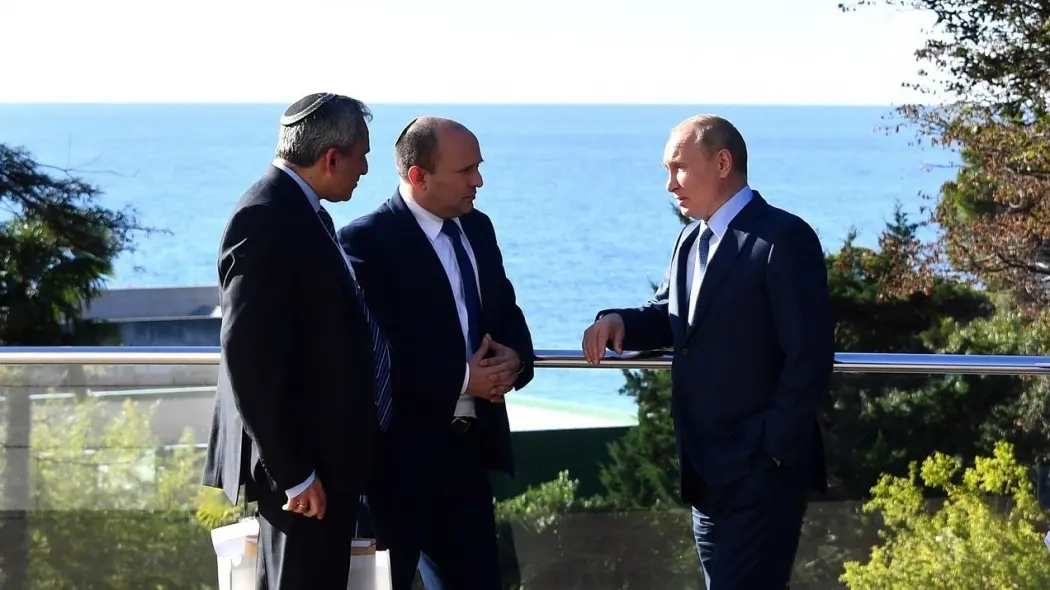In the first weeks after the Russian invasion of Ukraine, then-Israeli Prime Minister Naftali Bennett worked intensively behind the scenes on negotiations between Kiev and Moscow about a ceasefire agreement. Now, in a video interview, he has spoken for the first time at length about the process and the end of the negotiations.[1] At the time, Bennett said, a ceasefire was within reach, with both sides willing to make significant concessions. But the U.K. and the U.S., in particular, ended the process, he said, and set their sights on a continuation of the war.
Israeli ex-premier speaks for the first time about his negotiations with Putin and Zelensky
The Ukrainian President Volodymyr Zelensky had asked him, Bennett, to contact Vladimir Putin after the outbreak of the war. This is what the protocols say, he said. At that stage of the war, when the Russian army was outside Kiev, Zelensky feared for his survival. Bennett subsequently spoke with U.S. President Joe Biden and told him he could be a « pipeline » for contact with the Kremlin. A series of telephone conversations followed with both the Russian president and Zelensky. Draft key points of a ceasefire were exchanged. At the same time, Ukrainian and Russian delegations negotiated in Gomel, Belarus.
Then, on March 5, 2022, at Putin’s invitation, Bennett flew to Moscow in a private jet provided by Israeli intelligence. In the conversation in the Kremlin, Putin made, according to Bennett, some substantial concessions, in particular renouncing his original wartime goal of demilitarizing Ukraine. Bennett asked Putin if he planned to kill Zelensky. Putin assured him that he would not do so. On his way back, Bennett called Zelensky and told him the outcome. In return, the Ukrainian president agreed to renounce NATO membership – a position he also repeated publicly a short time later. This removed one of the decisive obstacles to a ceasefire.
Other topics, such as the future of the Donbass and Crimea, as well as security guarantees for Ukraine, had also been the subject of intensive talks during those days. Bennett said: “I was under the impression that both sides very much wanted a ceasefire.”
Bennett then first flew to Germany to speak with Chancellor Olaf Scholz, after which he talked to French President Emmanuel Macron, British Prime Minister Boris Johnson and the U.S. government including Joe Biden. At the time, Johnson, according to Bennett, had taken the « aggressive » position that « now we have to fight Putin, » whereas Scholz and Macron were more “pragmatic”. In the U.S. administration, both positions were represented.
In the days that followed, there was further intensive diplomacy with the warring parties. Bennett had coordinated his efforts « down to the last detail with the U.S., Germany and France. » Asked whether the Western allies ultimately blocked the initiative, Bennett replied, « Basically, yes. They blocked it, and I thought they’re wrong. » His conclusion: « I claim that there was a good chance of reaching a ceasefire had they not curbed it. » He said he could not judge whether the West’s decision to end the negotiating process was the right one in the long run.
Bennett’s statements, if accurate, raise some fundamental questions. Why did the NATO countries block the chance for a ceasefire at the time? What positions did the U.S., British and German governments take precisely? And is the West partly to blame for the subsequent escalation of the war? At that time, in March 2022, several thousand people had died in the war. Since then, more than 200,000 have died. Perhaps their deaths could have been prevented.
Image: Russian President Vladimir Putin with Israeli Prime Minister Naftali Bennett at the conclusion of bilateral talks in Sochi, Oct. 22, 2021. Image: Kreml / CC BY 4.0
[1] https://www.youtube.com/watch?v=qK9tLDeWBzs from 2:19:55
 DE
DE EN
EN ES
ES FR
FR